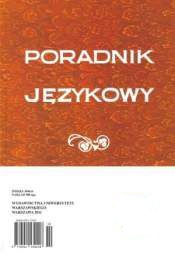JAK WŁADZA, BOGACTWO, WYSOKA POZYCJA SPOŁECZNA BUDOWAŁY W DAWNEJ POLSZCZYŹNIE PAŃSTWO
How POWER, RICHNESS, HIGH SOCIAL POSITION Built the State in Old Polish
Author(s): Julia LegomskaSubject(s): Language and Literature Studies
Published by: Dom Wydawniczy ELIPSA
Keywords: power; richness; old polish; bogactwo; wladza; władza; staropolszczyzna
Summary/Abstract: In the article, the author focuses on the presence of ideology in signification process. Her presumptions are based on the following theses by J. Fiske on ideology in meaning: (1) ideology is a process of social generation of meanings; (2) every kind of cognition is social and perspective, i.e. it occurs though acquisition of the point of view represented by the dominant group; (3) one of the key tactics of ideology is formation of 'the common feeling of common sense' by the society (not natural) and of ideological character, i.e. partly supporting the power of the authorities. Using this background, the author analyses the phenomenon of polysemy in the lexeme państwo (state) as it functioned in Old Polish. In the research, she has used the apparatus of cognitive linguistics, and the concept of cognitive domains by R.W. Langacker, in particular. By means of semasiological analysis, she presents the way the myth of power was justified in the old times, the power which was connected with high social position and richness (the myth as one of three functions of a sign in the second signification level). The text includes numerous contexts which show the sign support of upper relation of the notion WŁADZA (power) in the lexeme państwo (the state) as much stronger in the past than it is now, or frequent impossibility to separate the sense of 'possessing riches' from 'possessing a high social position.' The author offers the view as one of many possible ones in historical semantics.
Journal: Poradnik Językowy
- Issue Year: 2008
- Issue No: 01
- Page Range: 16-25
- Page Count: 10
- Language: Polish
- Content File-PDF

